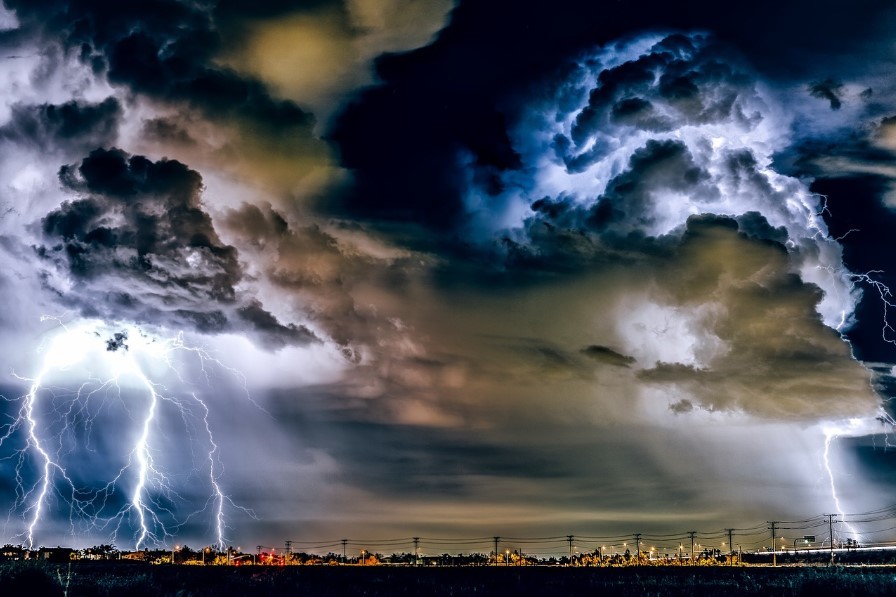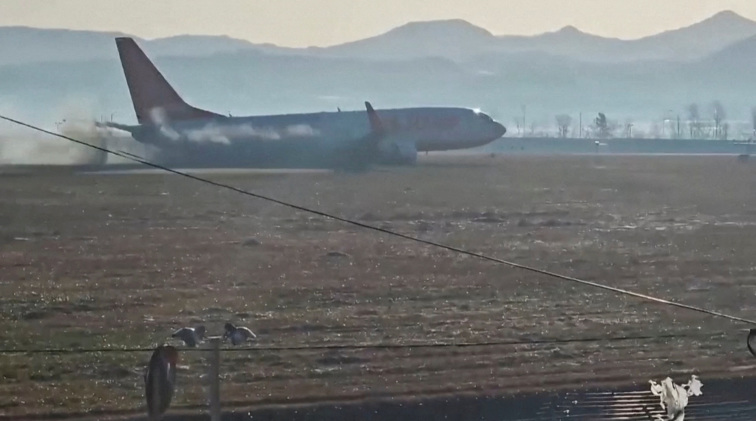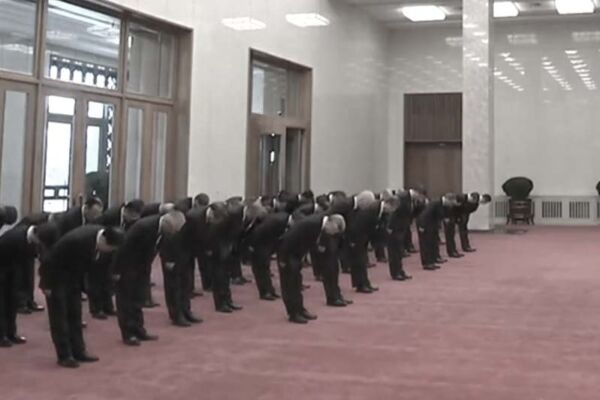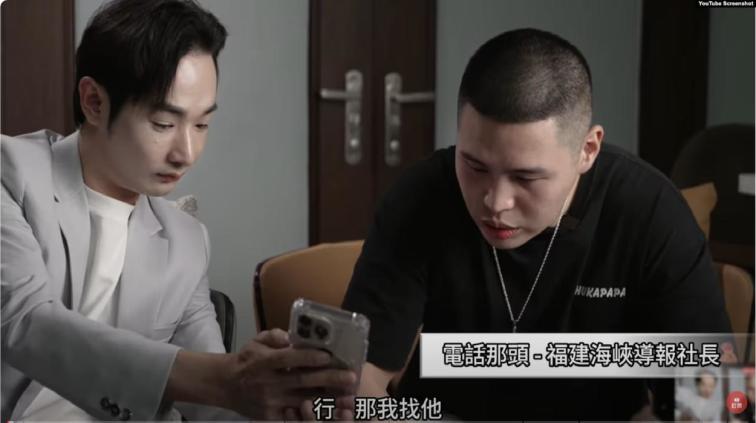Heavenly signs and phenomena often correspond to the rise and fall of dynasties, the fortunes and misfortunes of the world, and the blessings and disasters of mankind. (pixabay)
People News - On December 29, 2024, an article titled "Xi Jinping Losing Power: Signs of Major Change in China" was published online.
The author, Hui Huyu, analyzed the unprecedented intensity of internal conflicts within the Chinese military in 2024, especially during the second half of the year. Many high-ranking officers promoted and trusted by Xi Jinping have been systematically purged, including: Miao Hua, Director of the Political Work Department of the Central Military Commission (CMC); Lin Xiangyang, Commander of the Eastern Theater Command; Former Navy Commander Dong Jun; Two former Navy Political Commissars, Qin Shengxiang and Yuan Huazhi; Former Army Political Commissar Qin Shutong. Since the Third Plenary Session of the 20th Central Committee in July, rumors have been circulating that Zhang Youxia has begun to take over Xi Jinping's leadership of the military and is cleaning out Xi's loyalists. The worsening fate of Xi's faction in the latter half of the year lends increasing credibility to these claims.
The article suggests that there are currently three most representative anti-Xi factions within the upper echelons of the CCP.
In 2023, China experienced a severe economic downturn, marking the beginning of an economic and comprehensive social crisis. Xi Jinping's adoption of a "rule by espionage" model and his purge of senior military leadership, including the Rocket Force, signaled intensified internal party conflicts. In 2023, Xi carried out a purge within the military to secure his "absolute authority," targeting so-called politically disloyal "double-dealers" among the military's top ranks. This, in turn, triggered a counterattack from anti-Xi forces in 2024.
Who exactly are these rumored anti-Xi factions, and who is supporting Zhang Youxia in gradually diminishing Xi Jinping's control over the military? Judging by seniority, the core figures of the anti-Xi forces are likely Hu Jintao and Liu Yuan. Hu Jintao is the only living former CCP leader and was once Xi Jinping's benefactor. At the 18th Party Congress in October 2012, Hu fully relinquished power to Xi through a complete retirement, facilitating Xi's smooth succession. However, ten years later, at the 20th Party Congress, Xi Jinping publicly had Hu forcibly removed from the venue in front of the world's eyes and purged Hu's Youth League faction members from the highest circles of power, leading to a complete rupture between the two. It is foreseeable that once the opportunity arises, Hu Jintao would be among the most willing senior figures to take action against Xi.
Liu Yuan is regarded as one of the most significant figures among the "Red Second Generation" elites. His father, Liu Shaoqi, was the state chairman during Mao's era and held a position equivalent to a national-level leader, whereas Xi Jinping's father, Xi Zhongxun, held only a vice-national-level position. During the 1980s, under the CCP's "Third Echelon Training Program," Liu Yuan, Xi Jinping, and Bo Xilai were chosen as successors representing families of founding CCP leaders. The three were sent to grassroots positions to start their political careers—Liu Yuan to Henan, Xi Jinping to Hebei, and Bo Xilai to Shanxi. Among them, Liu Yuan achieved the most outstanding performance and won widespread public support, becoming a provincial-level official ahead of the others. In contrast, Xi Jinping's political career heavily relied on connections and patronage, and he did not garner the same level of prestige within the party as Liu Yuan.
In 2012, Liu Yuan's support played a critical role in Xi Jinping's smooth transition to leadership. Before Xi formally took office, Liu Yuan paved the way by spearheading anti-corruption efforts within the military. He exposed General Gu Junshan, the Deputy Minister of Logistics, which led to reprisals and several assassination attempts against him. After Xi assumed leadership, Liu continued to assist him in consolidating military control by helping to topple powerful military figures such as Xu Caihou and Guo Boxiong, both vice chairmen of the Central Military Commission. However, after Xu and Guo were removed, Xi Jinping sidelined Liu Yuan, stripping him of military power and assigning him to a ceremonial role in the National People's Congress.
As Xi Jinping abandons Deng Xiaoping’s policies and moves towards personal authoritarian rule, Liu Yuan has shifted from an early supporter of Xi to one of his harshest critics. In October 2023, the mysterious death of Li Keqiang created a chilling political atmosphere in Beijing. In November of the same year, taking advantage of the 125th anniversary of Liu Shaoqi's birth, many "princelings" gathered in Beijing and rallied around Liu Yuan. This group included Mao Zedong’s grandson Wang Xiaozhi, Zhou Enlai’s niece Zhou Bingde, Zhu De’s grandson Major General Zhu Heping and great-grandson Major General Liu Jian, Chen Yi’s son Chen Haosu, Hua Guofeng’s son Su Bin, General Zhang Yunyi’s son Major General Zhang Guangdong, and General Qin Jiwei’s son, Lieutenant General Qin Weijiang, former commander of the Eastern Theater Command’s ground forces. During this period, Liu Yuan published an article commemorating his father, borrowing Liu Shaoqi’s words to emphasize democratic centralism, asserting that the Party’s leadership should be collective, not individual—a clear critique aimed at Xi Jinping.
In December 2024, another rumor spread through Beijing’s political circles, claiming that Liu Yuan submitted a memorandum to the Party Central Committee expressing grave concerns about the Party’s survival. According to Australian-based Chinese legal scholar Yuan Hongbing, conscientious insiders within the CCP revealed that this memorandum was titled “Unnecessary Words,” echoing an article written by Qu Qiubai, an early CCP leader, before his execution by the Nationalists. In this memorandum, Liu listed a series of major crises facing the CCP, including economic and social crises, political crises, and tensions in the Taiwan Strait. Regarding the economic crisis, Liu argued that one fundamental reason for China’s current economic difficulties is the ultra-left economic policies implemented since the 18th Party Congress. Liu’s memorandum also proposed three recommendations to address the crises: returning to “Reform and Opening Up,” resuming a “hide and bide” strategy, and gradually transitioning the CCP into a social democratic party.
Liu Yuan, with his prominent status and considerable influence among the princelings, is seen as Xi Jinping’s most powerful challenger. If Hu Jintao represents the faction of retired elders opposed to Xi, Liu Yuan represents the princelings supporting Deng Xiaoping’s policies, and Zhang Youxia, another princeling, takes control of the military, could the combination of these three forces be sufficient to unseat Xi?
The article mentions that Shurong, a scholar of Yi Jing (Book of Changes) based in the UK, has made highly accurate predictions about China's political landscape.
Recently, Shurong shared her predictions for China's political developments in 2025 on the NTD program "Elite Forum." She stated, "In 2025, Xi Jinping's power will further diminish, rendering him a figurehead. This outcome stems from several factors: internal power struggles within the system, the lack of a consensus or a unifying leader like Sun Yat-sen or Chiang Kai-shek, which perpetuates the ongoing political infighting and instability."
Shurong added, "Xi Jinping will adopt a strategy of compromise to preserve his life, relinquishing substantive power while maintaining a nominal leadership position. Key figures such as Zhang Youxia will consolidate military authority, employing a low-profile and modest approach to balance various forces and strengthen his own power. Liu Yuan will also play an essential supporting role in this power dynamic."
She concluded that 2025 would be a period of intense political turbulence and transition for China. While Xi Jinping may lose real power, he will retain his title and harbor hopes of a comeback, believing the current situation is merely a temporary setback. The apparent equilibrium of power masks a profound underlying instability due to the unresolved conflicts among competing factions.
In 2024, Shurong had previously forecasted escalating internal struggles within the CCP, predicting intensified infighting that would further weaken Xi Jinping's authority. She also foresaw the emergence of a significant anti-government force in southern China. At that time, she speculated that while Xi Jinping might not step down in 2024, a major unfavorable event would likely occur in 2025, leading to his possible replacement by another figure within the system. Shurong suggested that this successor would initially face confusion about whether to abandon the CCP or continue Xi Jinping's path but would eventually be guided by influential advisors. This new leader would then embark on dismantling Communist influences across material, spiritual, and ideological realms, paving the way for China's transition toward democratic constitutional governance and a return to traditional values.
Shu Rong's predictions based on the I Ching actually align closely with the history of the Chinese Communist Party (CCP). The CCP’s gradual palace coup model was already played out between 1978 and 1981. On May 10, 1978, Hu Yaobang, then Vice President of the Central Party School and Minister of the Organization Department, published an editorial titled "Practice is the Sole Criterion for Testing Truth" in the internal publication Theory Dynamics of the Central Party School. This sparked a nationwide debate on the criterion of truth and marked the official confrontation with Hua Guofeng's "Two Whatevers" policy, laying the theoretical groundwork for the reform and opening-up policies set by the Third Plenary Session of the 11th Central Committee. The debate on the criterion of truth was essentially a gradual palace coup orchestrated by Deng Xiaoping to strip Hua Guofeng of his power. This debate lasted for three years, until Hua Guofeng gradually relinquished power and retired.
At the Third Session of the Fifth National People's Congress in 1980, Hua Guofeng was forced to resign as Premier of the State Council, with Zhao Ziyang taking over. At the Sixth Plenary Session of the 11th Central Committee in 1981, Hua Guofeng was forced to resign as Chairman of the CCP Central Committee and Chairman of the Central Military Commission, with Hu Yaobang succeeding him as Chairman of the Central Committee (a position later renamed General Secretary of the Party), and Deng Xiaoping taking over as Chairman of the Central Military Commission.
The article quotes a tweet from the Taiwan-based Chinese Nationalist Party (中华保台反共复国党) on X, revealing "The Astonishing Plan of Red Second Generation Zhang Youxia / The Chinese Military May Restore the Republic of China with U.S. Support."
According to Shu Rong's predictions from last year, the person who may replace Xi Jinping is likely someone from within the CCP system, but he will receive guidance from a higher power during his confusion and ultimately choose to eliminate the communist elements, including material, spiritual, and ideological factors. This suggests that mainland China will evolve toward democratic constitutionalism and a return to traditional values.
This also aligns with two major historical trends emerging in mainland China today: one is a historical wave led primarily by Falun Gong practitioners, aimed at restoring traditional Chinese culture and beliefs; the other is the Republic of China (ROC) revival movement, driven by mainland republicans advocating for a return to the ROC national title and constitution.
A significant contribution of Falun Gong practitioners in contemporary China's social transformation is that, in the face of the CCP's red terror, nearly 100 million practitioners, through their faith in the divine, have firmly rooted the principles of "Truthfulness, Compassion, Forbearance" in the ancient land of China. In the context of an atheistic society, they have reconstructed the relationship between heaven and humanity in traditional culture, becoming pioneers in dismantling CCP culture and restoring traditional Chinese values at the cultural level.
The spiritual awakening wave initiated by Falun Gong practitioners, urging people to withdraw from the CCP, has helped more than 400 million Chinese people resign from the CCP’s Party, Youth League, and Young Pioneers over the past twenty years. This has laid the most solid foundation of public support for a smooth transition of Chinese society into a non-communist era. Overseas, Falun Gong practitioners have promoted the true revival of Chinese culture globally. The Shen Yun Performing Arts Troupe, touring around the world, showcases true Chinese culture before the Communist Party to millions of global audiences every year.
The wave advocating for the return of the Republic of China is being jointly promoted by multiple generations of scholars in mainland China. Among them, Mr. Xin Haonian’s historical and philosophical masterpiece Who is the New China has played a key role in this movement. This comprehensive work, which clarifies the history of modern and contemporary China, has enlightened generations of young Chinese people, forming the broadest sense of national and historical value identity with the Republic of China on the mainland. This recognition has also deeply influenced the Chinese Communist Party’s leadership, including both political and military sectors.
On December 11, 2024, a tweet was posted by the Taiwan-registered third-party political organization, the Chinese Nationalist Party to Protect Taiwan and Oppose Communism (referred to as the Restoration Party). The tweet was titled "The Astonishing Plan of Red Second Generation Zhang Youxia / The Chinese Military May Restore the Republic of China with U.S. Support." The tweet stated: "Recently, there has been significant news from the Chinese military: Zhang Youxia, Vice Chairman of the CCP Central Military Commission and a highly watched leader of the Red Second Generation, has been revealed to be secretly planning a major action that will change China’s future. According to his close aides, Zhang Youxia is planning, with U.S. support, to restore the Republic of China’s national title and system after the CCP disintegrates. Even more astonishing, Zhang Youxia recently commanded the arrest of Xi Jinping's most important ally in the military, Miao Hua, who holds significant power over personnel decisions. This action is seen as a key step in weakening Xi Jinping’s military authority. At the same time, Zhang Youxia is consolidating military power through a series of actions, paving the way for the dissolution of the CCP and the return of the Republic of China."
Although we cannot yet verify the authenticity of this leak, we also cannot deny the immense possibility that the political situation in mainland China could evolve toward a return to the Republic of China. The combination of traditional values and national identity, along with the positive historical logic and real forces of justice, is bringing an increasingly bright future closer to the Chinese people.










News magazine bootstrap themes!
I like this themes, fast loading and look profesional
Thank you Carlos!
You're welcome!
Please support me with give positive rating!
Yes Sure!